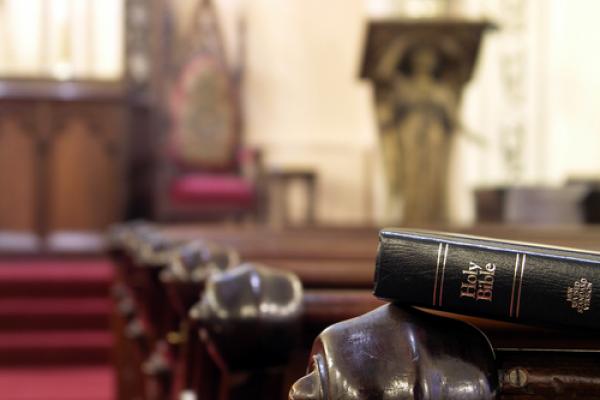One-in-five adults in the United States — and a third of adults under 30 — say they have no religious affiliation. The numbers are out in a new report called “’Nones’ on the Rise,” put out by the Pew Forum on Religion and Public Life. That 20 percent of the population is up from 15 percent just five years ago.
But while our church membership rolls may be shrinking, “unaffiliated doesn’t necessarily mean wholly secular,” said senior researcher Cary Funk at the Religion Newswriters Association Conference in Bethesda, Md., on Saturday.
In fact, two-thirds of the 46 million Americans self-identifying as having no religion also say they believe in God. And 21 percent of them say they pray every day. A large portion of this group — 37 percent — say they consider themselves “spiritual but not religious.”
The increase in disaffiliation goes hand-in-hand with an overall lack of trust in American institutions across the board, from the government to the news media, and now, to our houses of worship.
The “nones” overwhelmingly say religious institutions are too concerned with money and power, and 67 percent say they both focus too much on rules and are too involved in politics.
So where are the “nones” coming from? That uptick in those checking “nothing in particular” comes largely from a shrinking number identifying as evangelical or mainline Protestant — a decline from 53 to 48 percent since 2007. An influx of Latin immigration has supplanted any decline of Catholic affiliation.
But another source is simple generational replacement, as the unaffiliated are overwhelmingly concentrated in the millennial generation.
Millennials Drop the Labels
Pew Forum senior researcher Greg Smith said not only are millennials more likely to be unaffiliated, but “they’re more likely to be unaffiliated than previous generations were at their age” — meaning, the group is unlikely to change as they get older.
Thirty percent of millennials overall (age 18-31) identify as unaffiliated. But when you break that down to younger millennials (age 18-25), a full third of our youngest voting bloc says they have no religion.
This is in large part to the fact that unaffiliation among parents is on the rise. Much of the millennial generation was raised in household with no religion.
Political implications
The group —which also includes atheists and agnostics — largely swings left. More than six-in-ten say they are Democrat and 38 percent identify as liberal. And that divide is on the increase.
In 2008, 75 percent of the “nones” voted for the Democratic candidate, up from 61 percent in 2000.
“In the future, unaffiliated vote may be as important to the Democratic party as traditional religions are to the Republican Party,” said John Green, senior research adviser for Pew.
The unaffiliated — as with young Millennials — don’t vote at the same rate as those in traditional religions, and neither candidate has been able to mobilize the group.
But the “nones” are the Democratic Party’s single largest religious group. If mobilized effectively, they could become critical in November.
Key statistics
- 88 percent of “nones” are not looking for a religion
- Since 2007, unaffiliated have risen from 17 to 24 percent of all registered voters who are or lean Democrat
- The number of unaffiliated has increased consistently across demographics — college educated and not, male and female, high and low income, and in all regions of the country.
- Only 27 percent of “nones” say they do not believe in God or a universal spirit.
- 52 percent of “nones” say religious institutions “protect and strengthen morality” compared with 76 percent of the U.S. general public
- 72 percent of “nones’ say abortion should be legal in all or most cases
- 76 percent of “nones” say homosexuality should be accepted by society, and 73 percent say they are in favor of same-sex marriage
Sandi Villarreal is Associate Web Editor for Sojourners. You can follow her on Twitter @Sandi.
Got something to say about what you're reading? We value your feedback!
